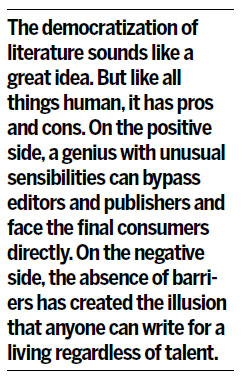Obviously not every online writer is as talented as Wu Xuelan or Murong Xuecun. Percentage-wise, much online fiction can be correctly called "trash". Who can produce 10,000 words a day and retain any semblance of quality? I have heard of daily outputs that I cannot even get through reading, let alone writing. Mind you, this is not a spurt of creativity, but a level of drudgery maintained year round.
If you churn out a tome as thick as Les Miserables on an annual basis, rest assured it's never going to be as good as Les Miserables. Of course, the target readers are not expecting great literature anyway. In a recent survey of 3,000 respondents, A Dream of the Red Mansion, arguably China's number one fiction masterpiece, topped a list of "boring books". Les Miserables was not on it, but it could well have been.
Today's readers just yearn for a good yarn. But collectively they have shattered a preconceived notion that reading in the digital age has turned fragmentary. Indeed, reading the multi-volume A Dream of the Red Mansion on a smartphone or a tablet seems a hassle, but it is no longer an outlandish idea. China's own online readers have shown that they are willing to get through thousands of pages of digitized content if they deem it interesting.
Amazon was betting on mass migration to the digital platform when it launched two of its Kindle e-readers in China in early June. The online behemoth already owns an online bookstore in China that sells old-fashioned print copies, and now it is covering the base that serves future needs. According to a friend of mine who works in the publishing industry, Amazon's entry into China's digital reader market has already caused ripples. Websites that used to offer downloading of pirated books have suddenly shifted gear and got into the legal e-book business.

This implies that there's money to be made in this segment, which, in turn, means people are migrating en masse to the new paperless platform for serious reading. However, this is yet to be supported by empirical evidence gathered on a bus or train ride. On a long commute, the most popular activity is by far listening to music. Only occasionally do you spot someone with a book, almost always a test prep book of some kind. The recent rise of the tablet has given way to a trend for watching videos and playing games. Again, there is the odd person scrolling down pages of text, perhaps a classic tome or a modern-day fantasy by a literary hack like Sollong.
The democratization of literature sounds like a great idea. But like all things human, it has pros and cons. On the positive side, a genius with unusual sensibilities can bypass editors and publishers and face the final consumers directly. On the negative side, the absence of barriers has created the illusion that anyone can write for a living regardless of talent. In reality, the removal of the middlemen (editors and publishers) has shifted the cost of winnowing out the worthless to the readers. Because virtual space does not entail any cost like page layout and printing, a literature website can function like a kitchen sink.
That's why people who regard time as valuable would never trudge through a morass of online fiction to get to that rare gem. They would rather pay a higher price for professional editors to do the dirty job for them. You can argue that printed potboilers do not have much quality either, but still the worst has probably been rejected already.
Reading habits change over time. Theoretically, good literature is worth reading on any medium. But the change of medium from print to digital will definitely affect content. And it could affect pricing and profits too, allowing them to come from sources other than a single payment for a book. Advertising, monthly subscriptions and pay-per-word may also surface as possible revenue models.
Works by Dickens and Louis Cha appeared in installments, which were surely correlated to the authors' earnings. They are long, but in no way do they read like they were written by zombies. Today we do not remember them as writers of newspaper serials, but simply, as great novelists. For China's online crowd of scribblers, or rather, typists, their staying power will emerge when the medium of the Internet is no longer relevant.
